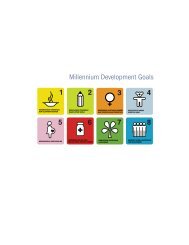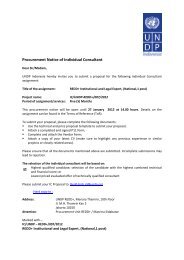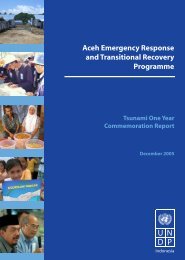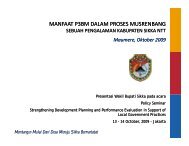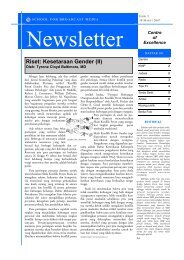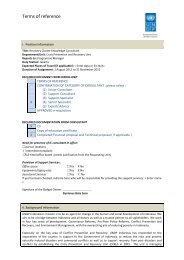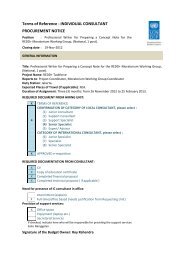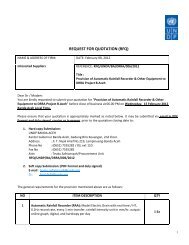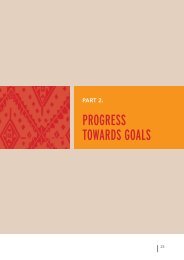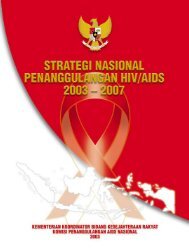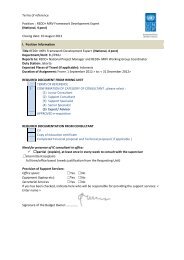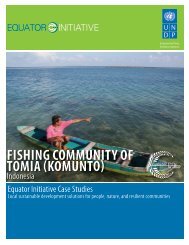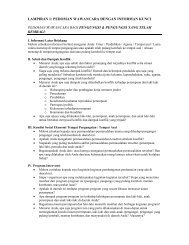Papua Needs Assessment - UNDP
Papua Needs Assessment - UNDP
Papua Needs Assessment - UNDP
Create successful ePaper yourself
Turn your PDF publications into a flip-book with our unique Google optimized e-Paper software.
are not used directly as the basis for fund allocations and in implementing development activities.<br />
Planning and budgeting systems are often not synchronized. Subsidies from the province to city<br />
/ kabupaten governments to support the achievement of common strategic or policy goals are<br />
also rare, as there is a strong preference for bureaucracies to claim credit for their own projects.<br />
OTSUS provides a unique opportunity for a much stronger link between the provincial and local<br />
(City and kabupaten) government, however this potential cooperation has yet to be realised.<br />
Between province and local governments, and within government institutions, there is limited<br />
experience in cross-institutional work or collaboration. A focus on delivering short term, timebound<br />
‘projects’ dominates the thinking and activities of civil servants at all levels of government<br />
in <strong>Papua</strong>. This is as opposed to longer-term, holistic thinking about what development means or<br />
how it should be measured. Similarly the provision of services, and related issues of consistency<br />
and quality or the fulfilment of public needs and rights, do not receive the necessary attention in<br />
local, ‘projectised’ development.<br />
In general, there is little or no communication and involvement between government and CSOs on<br />
policy formulation, with local realities, lessons, experiences and needs being considered in<br />
formation of local policy instruments. There is limited effort to monitor, evaluate, share, and apply<br />
lessons for improved policies and practice; examples of what works where and why are not being<br />
replicated. Collaboration between government and CSOs on service delivery is minimal. Through<br />
the PNA, government and CSOs have shown increasing willingness to share, learn, cooperate in<br />
service delivery but do not have much prior experience on how to do this. Workshops and seminars<br />
succeed in bringing people together to exchange of information and views. However, further effort<br />
is required to facilitate other forms of cooperation and applied learning between development<br />
stakeholders in <strong>Papua</strong>.<br />
In summary, one of the primary weaknesses of governance in <strong>Papua</strong> is that of local government<br />
planning, especially planning with the active participation of civil society and the private sector.<br />
The lack of interaction and collaboration between provincial and city/kabupaten government, and<br />
the weakness of government at the kecamatan and village levels further undermines the capacity<br />
of local governance to prepare and implement development plans and programmes. This situation<br />
has so far resulted in inefficiency and opportunities for corruption through the misappropriation of<br />
public funding. Decades of policies to safeguard the environment, alleviate poverty, respond to<br />
basic rights, clean water, health and education have suffered from poorly planned development<br />
programmes.<br />
4.5 Capacity issues<br />
Within the broader assessment of governance, the relevance of focusing on the capacity of all<br />
development actors in <strong>Papua</strong> has been highlighted. The assessment of needs and capacities<br />
generally is constrained by the limited capacity amongst government and civil society to collect,<br />
analyse and use data, and to manage and assure quality of consultancies and project activities.<br />
The importance of improving data-related capacities amongst province, kabupaten and kecamatan<br />
government agency personnel cannot be overstated.<br />
Local assessments of needs and capacities conducted by local university and NGO partners as<br />
part of the PNA focused overwhelmingly on what is lacking and what has failed. Difficulties in<br />
identifying and analysing the capacities that do exist, what does work and why, and what can be<br />
developed further suggest that issues of low confidence and self-esteem affect local perceptions<br />
of what is possible and how <strong>Papua</strong> could develop. Partners in the needs assessment have good<br />
local knowledge, which is grounded in the experience of local cultures and communities’ histories.<br />
Consultants from outside <strong>Papua</strong> often have good qualifications and expertise but often bring<br />
strong cultural biases to their work in <strong>Papua</strong> and are thus unable to effectively assess local<br />
19



